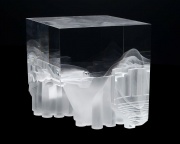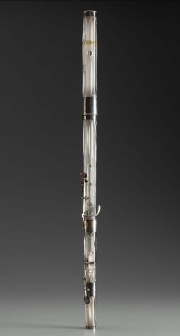Difference between revisions of "Crystal glass"
Jump to navigation
Jump to search
(username removed) |
|||
| Line 2: | Line 2: | ||
== Description == | == Description == | ||
| − | A high quality, heavy, decorative [ | + | A high quality, heavy, decorative [[glass]] that contains at least 24% [[lead tetroxide|lead oxide]]. Crystal glass is made with fine white [[sand]], lead oxide with small amounts of [[potash]] and [[niter]]. The clear, colorless glass is highly refractive (about 1.7) producing brilliant optical effects. Crystal glass is heavy and has greater than twice the density of standard borate glass. Lead crystal, developed in England in 1676, has been used for high quality chandelier prisms and fine stemware. |
[[File:1994.241-SC61640.jpg|thumb|]] | [[File:1994.241-SC61640.jpg|thumb|]] | ||
| + | |||
== Synonyms and Related Terms == | == Synonyms and Related Terms == | ||
Revision as of 13:00, 13 January 2014
Description
A high quality, heavy, decorative Glass that contains at least 24% lead oxide. Crystal glass is made with fine white Sand, lead oxide with small amounts of Potash and Niter. The clear, colorless glass is highly refractive (about 1.7) producing brilliant optical effects. Crystal glass is heavy and has greater than twice the density of standard borate glass. Lead crystal, developed in England in 1676, has been used for high quality chandelier prisms and fine stemware.
Synonyms and Related Terms
lead crystal; leaded crystal; potash-lead glass; flint glass; cristal (Fr., Port.); kristal (Ned.);
Authority
- G.S.Brady, Materials Handbook, McGraw-Hill Book Co., New York, 1971 Comment: p. 364
- Walter C. McCrone, John Gustave Delly, The Particle Atlas, W. McCrone Associates, Chicago, IV, 1972
- Susan E. Schur, Conservation Terminology: A review of Past & Current Nomenclature of Materials, Technology and Conservation, Spring (p.34-39); Summer (p.35-38); Fall (p.25-36), 1985
- Dictionary of Building Preservation, Ward Bucher, ed., John Wiley & Sons, Inc., New York City, 1996
- Random House, Webster's Encyclopedic Unabridged Dictionary of the English Language, Grammercy Book, New York, 1997
- The American Heritage Dictionary or Encarta, via Microsoft Bookshelf 98, Microsoft Corp., 1998

